|
Music Is The Healing Force Of The Universe The Inconsistency of |
|
|
||||||||||||||||
|
News from 2014 - January to June January 1 2014 Happy New Year! * ESP Reissues ESP have released a vinyl edition of New York Eye and Ear Control to mark its fiftieth anniversary. There’s a review on the Audiophile Audition site. ESP have also reissued Live on the Riviera and there’s a review of that on the Gapplegate blog and another review on the All About Jazz site from last summer which Steve Tintweiss caught. * Art Ensemble of Chicago play Ghosts So, six months late with that one, and seven years late with this. I actually came across this on facebook, where there’s an Ayler group which Axel Van Looy told me about. Although I’m on facebook I’ve never really ‘embraced’ it. I tend to go on, get confused by what everybody’s having for breakfast and switch it off. However, I thought I should persevere with this and I read all the posts (ignoring the Bulgarian woman trying to sell a sculpture) and found a couple of interest. One from Marty Kahn: “First band I ever saw live at 14...Albert Ayler at the Astor Place Theater, with Donald, Charles Tyler, Joel Freedman, Lewis Worrell (I think) and Shannon Jackson. Sunny Murray did a solo in between sets. It all made perfect sense to me...as clear as going to Church and I walked home on a street made of feathers. (but Bird confused the hell out of me - so much for Albert being inaccessible!)” And another from Eric Jackson about the Fondation Maeght concerts, recalling seeing the F.M. film at the Montreux Jazz Festival in 1973. And then there was this link to youtube of the Art Ensemble of Chicago playing ‘Ghosts’ in Hamburg, Germany on 14th July, 1987. It’s taken from a radio broadcast, which seems to have been circulated around 2007 and the full ‘CD’ can be downloaded from the BigO Magazine site. * Albert Ayler Disappeared As well as sending the links to the reviews of the ESP reissues, and a couple of items from Swiss newspapers (a review of The New Wave In Jazz and an obituary of Albert Ayler), Yair Dagan also found this, the full text of F. A. Nettelbeck’s Albert Ayler Disappeared, first published in 1989, long out of print, and now available at the Gonzo Library of the Indy Outlaw. Make of it what you will. Yair also sent this picture of an item on ebay, Ayler ‘buttons’, although they look like badges to me and if there’s one thing we don’t need ... |
 |
|||||||||||||||||||||||||||||||||
|
And from youtube A solo guitar version of ‘Ghosts’ by Adriano Lanzi. A version of DON Ayler’s ‘Our Prayer’ by the Trio Kontraszt.
|
|||||||||||||||||||||||||||||||||
|
A version of ‘Mothers’ by the Glenn Spearman Trio, recorded 9th March, 1994. And, although there’s no Ayler connection, I thought I should mention this Marzette Watts LP. Steve Tintweiss told me about it and added these comments: “This includes one of the final sessions recorded by legendary bebop engineer Jerry Newman at his NYC studio in 1968. Ornette Coleman's "Lonely Woman" features Patty Waters as the vocalist for which she wrote her own lyrics on which I'm playing bass on the right channel along with Patty's reprise as a duet near the end. Cevera Jeffries plays bass on the left channel. There are several names misspelled on the album, including singer Amy Sheffer in a rare appearance on a couple of the other tracks. "October Song" (posted as Marzette Watts Ensemble 1) has a larger band including Bobby Few-piano, Tom Berge-drums, George Turner-cornet, Frank Kipers on violin with both Patty Waters and Amy Sheffer performing wordless vocals. A couple of tracks from Marzette's two sessions on this Savoy LP were included on the Arista vinyl compilation issue of "New Music: Second Waves" with the musician credits and stereo tracks reversed. The other half of the recording was from a New Jersey studio session with project producer Bill Dixon playing piano along with Marzette, Juny Booth on bass, and J.C. Moses on drums. No CD releases to date on either Savoy (or Japan Victor which bought the Savoy catalog) nor on the Arista label. This album also represents a fine example of Marty Cook playing trombone in a very warm but free form avant-garde jazz style. A rare LP. Happy Holidays, Steve Tintweiss” Finally, I came across the following when I was renovating the site, added it to the Tributes and Bibliography pages, but meant to mention it here as well. It’s a brief extract from a film of Douglas Wright’s ballet, ‘Hey Paris’, directed by Gregor Nicholas in 1987. The Ayler track is from the Relyable LP, The Berlin Concerts - 1966. Warning: contains violence, nudity and modern dance.
|
|||||||||||||||||||||||||||||||||
|
What’s New October to December 2013 has now been archived. ***
February 1 2014
Amiri Baraka (7/10/1934 - 9/1/2014) Amiri Baraka (aka LeRoi Jones), poet, playwright, critic and political activist died on 9th January in Newark, NewJersey, at the age of 79. He was a major figure on the American arts scene from the 1960s till now and was always a source of much controversy, so there are plenty of obituaries online: New York Times, New York Daily News, Los Angeles Times, allAfrica.com. Therefore, I will confine my comments to his association with Albert Ayler. |
|||||||||||||||||||||||||||||||||
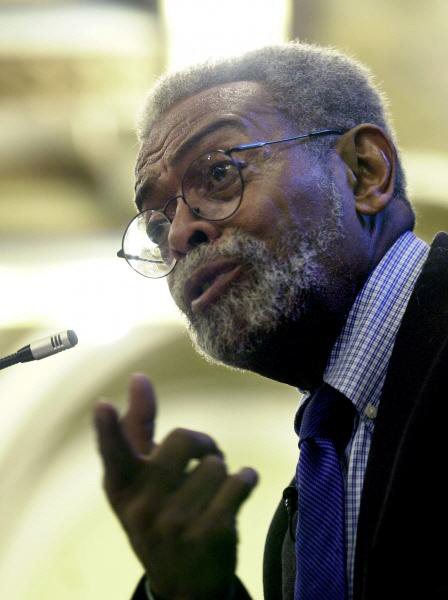 |
|||||||||||||||||||||||||||||||||
|
It is perhaps over-simplistic to divide the musicians of the Free Jazz movement into three categories, those who were primarily interested in the music (Ornette Coleman, Cecil Taylor), those who followed a more political path (Archie Shepp) and those who embraced a spiritual one (Sun Ra, Albert Ayler). The lines shift and blur, and where would you put John Coltrane? However it is certain that Amiri Baraka, LeRoi Jones as he was back then, radical poet and playwright, heard the extreme sounds of Free Jazz and equated them with the political struggle of the Black Power movement. Thus he championed the new jazz and its most extreme players as fellow political activists and his influence during the early years cannot be underestimated. In the case of Ayler, Baraka was instrumental in the production of the LP, Sonny’s Time Now, releasing it on his own Jihad label. That particular record does sit uneasily in the Ayler discography. Along with New York Eye And Ear Control, it is the only other record on which Ayler is not the leader. NYEAEC is a free improvisation by a group of musicians, Sonny’s Time Now is a Sunny Murray LP. But, both are accepted as part of the Ayler canon, and, in the case of the latter, Ayler gets to play behind Amiri Baraka reciting ‘Black Art’. Which seems so out of place alongside the rest of his oeuvre. When the LP was reviewed in the British magazine, Jazz Monthly, it caused a minor flurry of letter-writing, and a rumour that LeRoi Jones had got the musicians drunk and forced them to play, but I doubt it, somehow - the lines shift and blur, it’s just music and a record date and presumably some money. Sometimes we take the bits of Ayler we like, and ignore the bits we don’t. If you want to get a clearer picture of the relationship between Baraka and the Ayler brothers I suggest you read the story, ‘Now and Then’, originally published in Tales by LeRoi Jones, and still available in The Fiction of Leroi Jones /Amiri Baraka (Lawrence Hill Books, 2000). So it’s still very much in copyright, but I thought I’d scan the earlier copy and put it on a page, until I’m ordered to remove it: Baraka was also responsible for a magazine called The Cricket which published the strange piece by Albert entitled ‘To Mr. Jones - I Had a Vision’. The other notable connection with the Ayler brothers is the recording he made of a band led by Don Ayler in 1968 (after his split with Albert) which was intended for release on the Jihad label, but which never materialised. Again, the rumour is that it was just too bad to be released, but one wonders. I did email Mr. Baraka a few years ago and asked him if he still had the tape, and he said he’d have to look for it. Which means nothing, of course, but perhaps, somewhere down the line, it may turn up in a list of items in the Amiri Baraka archive in some American university. I should also mention the essay by Baraka in the book which was included in the Holy Ghost box, an extended version of which is available in Digging: The Afro-American Soul of American Classical Music (Music of the African Diaspora) by Amiri Baraka (University of California Press, 2009) under the title ‘You Ever Hear Albert Ayler?’. Going back to the online obits and related material. There is a nice article by Richard Brody, ‘Amiri Baraka’s Life- Changing Jazz Writing’, on the New Yorker site. And I came across two accounts of Amiri Baraka’s funeral, one on the Billboard site, the other on newjersey.news12.com, which also carries some facebook comments which, well, frankly, they make one despair. The obituary in Le Monde includes some youtube links, including one to the recording of ‘Black Art’. And the one in The Guardian concludes with the following: ‘Baraka was the subject of a 1983 documentary, In Motion, and holds a minor place in Hollywood history. In Bulworth, Warren Beatty’s 1998 satire about a senator’s break from the political establishment, Baraka plays a homeless poet who cheers on the title character. “You got to be a spirit,” the poet tells him. “You got to sing – don’t be no ghost.”’ * Roy Campbell Jr. (29/9/1952 - 9/1/2014) Sad to report that Roy Campbell Jr. passed away on the same day as Amiri Baraka, at the age of 61. There are obituaries online at the New York Times and the New Yorker, but he is specifically remembered here for his many tributes to Albert Ayler, as a member of Marc Ribot’s Spiritual Unity group, and the 2009 CD, ‘Tribute to Albert Ayler - Live at the Dynamo’, where he played alongside Joe McPhee, William Parker and Warren Smith.
|
|||||||||||||||||||||||||||||||||
|
And, just to round off this obituary section, I thought I’d mention the death of Yusef Lateef, in December, at the age of 93. No connection to Albert Ayler, but I hadn’t heard the news until I read the New York Times obituary for Roy Campbell Jr., who studied for a while with Yusef Lateef and there was a link to his obituary. * Sunny’s Time Now Note the vowel change. Last month I mentioned there was an Ayler group on facebook, and that’s where I spotted this link to Antoine Prum’s 2008 documentary film about Sunny Murray, which is now available on the Culture Unplugged site. I have to admit I haven’t found time to watch the whole film yet, but dipping into it at random, it does appear to stray from the subject of Murray into a wider discussion about Free Jazz, and especially that period in the early 70s when it seemed that America had rejected it and France had adopted it. Below is the description of the film taken from promo material for the 2009 DVD release. |
|||||||||||||||||||||||||||||||||
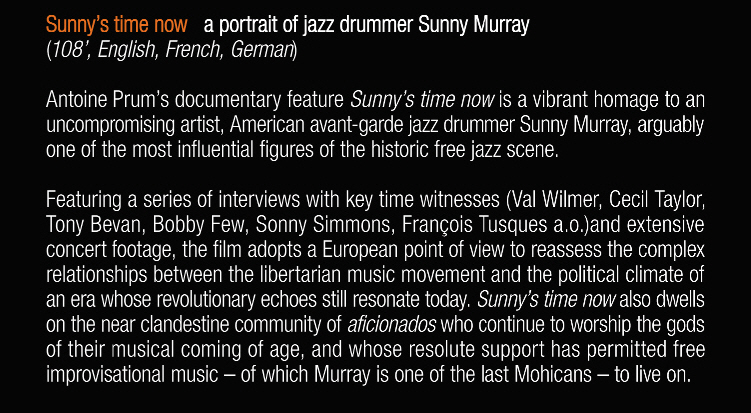 |
|||||||||||||||||||||||||||||||||
|
Count Basie One of the oddest entries on the Versions page is the 1970 Count Basie LP, ‘Afrique’, which contains ‘Love Flower’ (from Love Cry) among its tracks. It’s been unavailable for some time now and I’ve never heard it, but it has just been released on CD. There’s a review on theartsdesk.com according to which: “Bob Thiele, of Flying Dutchman Records, was a fan and decided in 1970 to see if he could revitalise and update the Basie sound. Afrique was the result.” |
|||||||||||||||||||||||||||||||||
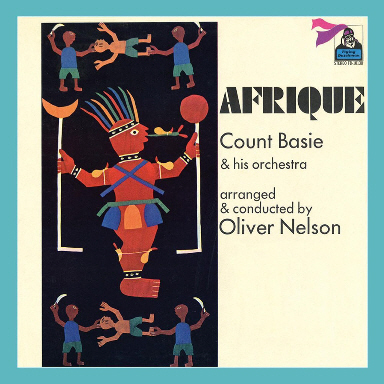 |
|||||||||||||||||||||||||||||||||
|
Marc Ribot on the BBC Sean Wilkie emailed to ask if I caught the Marc Ribot interview on the BBC’s Jazz on 3 programme broadcast on 27th January. I didn’t, but it is still available (along with other stuff) on the iplayer, until 2nd February. Since that means most will miss it, I’ll add Sean’s comment about the Ayler content: “The only part about Albert came when he said that Anthony Coleman had pointed him towards Ayler’s music, when both were playing in Rootless Cosmopolitans. Ribot was playing some patterns with the harmonic overtones of the guitar strings and Coleman remarked on their similarity with (some of) Albert’s music, with which Ribot apparently was then unfamiliar.” Sean also included some further information about an Ayler tribute CD from 1991 - ‘The Preacher & The Ghost’ by Nexus. ‘The drummer, Tiziano Tononi, is credited with all the compositions and arrangements. There are two suites of five tracks each. He writes the following notes: Albert the Preacher … Albert the Ghost … Albert the Wizard … Albert who knows … Albert Ayler was all this, and much more. One of the most influential, forgotten, denied, obscure and beloved figures emerged from that strange everchanging intense season that the Sixties were. He left a Universal Message (“We play peace”) that we want to spread, and a heritage that has to be kept on. Albert Ayler died in New York in November 1970, his body found in the East River … Long live The Ghost. Tiziano Tononi [and then, in smaller type] Ayler’s compositions I’ve been inspired by to compose these materials and that can be heard totally or partially here are Ghosts, for John Coltrane, Music is the Healing Force of the Universe, Spirits Rejoice, Infinite Spirit, Holy Family for “… of Ghosts, Witches & Devils”, while I chose Mothers, A Change Has Come, Heavenly Home, Divine Peacemaker and Angels for “L’Orchestre Hallucinant” ’ * Archie Shepp on Albert Ayler There’s an interview with Archie Shepp on youtube, which has been cut up into short segments. In this one he recalls an encounter with Albert Ayler.
|
|||||||||||||||||||||||||||||||||
|
March 1 2014
Albert Ayler and Patty Waters I received an interesting email from Steve Tintweiss, prompted by the inclusion of Patty Waters in this list of Women in Music: Trailblazing female singers, songwriters and musicians: “This widely distributed pre-Grammy Awards night (January 26) article and photos highlights the twenty-two "Women Who Changed Music" selection as part of the AOL "Women Makers" historical series. Patty Waters is slide 5 recognized for her vocal free-jazz innovation and widely acknowledged influence on free jazz and prominent avant rock artists, as exemplified in her debut ESP-Disk' album "Patty Waters Sings" with her wild version of "Black is the Color of My True Love's Hair" which still shocks listeners 48 years later. This is a major honor and acknowledgement which Patty Waters really cherishes and it came as a big surprise to her. When ESP-Disk was scouting and recording its initial roster for the new label, Bernard Stollman got a recommendation from Albert Ayler, who was his lead artist in the catalog, to record Patty Waters. Pianist Burton Greene who was already on the ESP roster put together a trio of Tom Price on drums, and myself on bass to back up Patty in her debut recording. It was also my first recording at the age of nineteen. Of course Patty Waters was one of the first vocalists to be highly influenced by Albert Ayler, as it was her first public opportunity to expand her prior stylistic experience as a teenage torch singer of jazz standards as influenced by Nina Simone and Billie Holiday among others. The bottom line is if Albert Ayler had not brought Patty Waters to the attention of Bernard Stollman, she would have never gotten the opportunity to record such a revolutionary album. Given her dearth of subsequent records and performances, and her shy personal nature, I am convinced that if it weren't for Albert Ayler's leadership in spotting and encouraging new talent in the early free jazz movement, Patty Waters would have remained completely unknown, unrecorded, and never achieved the recognition exemplified in the AOL media blog and elsewhere. There are so many extremely talented and innovative musicians who were never recorded, especially in those days when record companies controlled the industry, that we all knew someone who was only known by a few local like-minded musicians. This included Albert Ayler who considered a local drummer who I once played with as the greatest free jazz drummer he ever heard. Unfortunately, he did not want to travel or play low paying gigs, but just liked playing drums with others in his home basement in Queens NY. BTW, AOL invited reader suggestions through Twitter to suggest additional women music pioneers who forever changed the art form. I suggested Carla Bley for that distinction. While I did see some suggestions re-tweeted the original list of twenty-two women musician trailblazers was not updated. Thanks, Steve Tintweiss” * J-Disc I have to thank Pierre Crépon for letting me know about the J-Disc discography project from Columbia University. It’s an offshoot of the Jazz Studies Online site and in time should prove an invaluable resource. However, at the moment, it’s a bit of a strange beast. There are a lot of entries under Albert Ayler’s name, but it’s far from a complete sessionography. And, checking a few of my other favourites, Jimmy Giuffre’s entry is very sparse, and Fess Williams is not mentioned at all. So, very much a work in progress. However, according to the ‘About Us’ page, J-Disc is going to tackle the issue of digital-only releases of jazz recordings, so I wish them good luck with that. * Tea-time with Albert Ayler I wonder what J-Disc will make of this: |
|||||||||||||||||||||||||||||||||
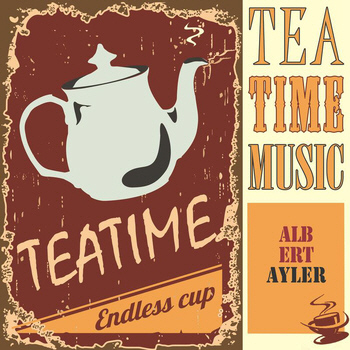 |
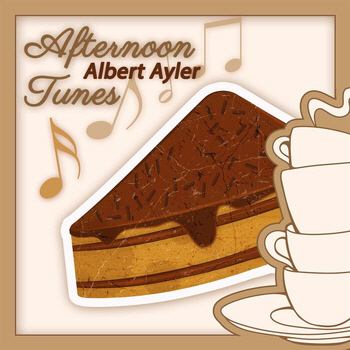 |
||||||||||||||||||||||||||||||||
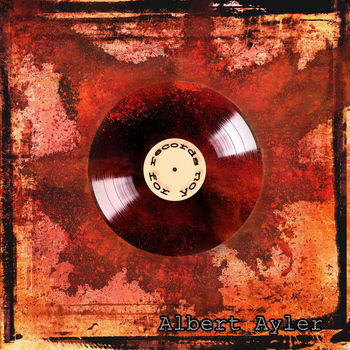 |
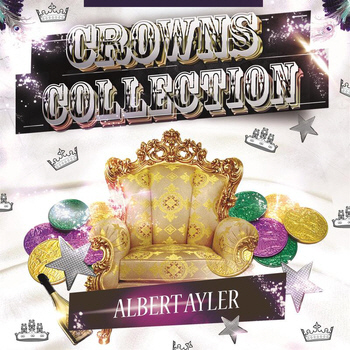 |
||||||||||||||||||||||||||||||||
|
‘Tea Time Music’, ‘Afternoon Tunes’, ‘Records For You’ and ‘Crowns Collection’ by Albert Ayler, are all listed on the 7digital site and amazon, as mp3 download albums. They are all versions of My Name Is Albert Ayler. I just don’t understand why there are four of them. * Arthur Doyle (26/6/1944 - 25/1/2014) I thought I should mention the passing of Arthur Doyle, which I missed last month. Although there’s no real connection with Ayler, his spirit was frequently invoked in reviews of Doyle’s music. There are obituaries on Tiny Mix Tapes, Red Bull Music Academy and Burning Ambulance . * Spiritual Trio A couple of Ayler tributes from youtube by a Sardinian trio of vibes, guitar and bass, performing in front of Kasper Collin’s My Name Is Albert Ayler (which, incidentally has also reappeared on youtube). There’s a version of Don Ayler’s ‘Our Prayer’, and here’s ‘Bells’:
|
|||||||||||||||||||||||||||||||||
|
April 1 2014
La musica e la rivolta - Albert Ayler A bit late with the news, but there was a three day tribute to Albert Ayler held at the Teatro Garibaldi in Palermo, Italy, on 21st to 23rd of March. |
|||||||||||||||||||||||||||||||||
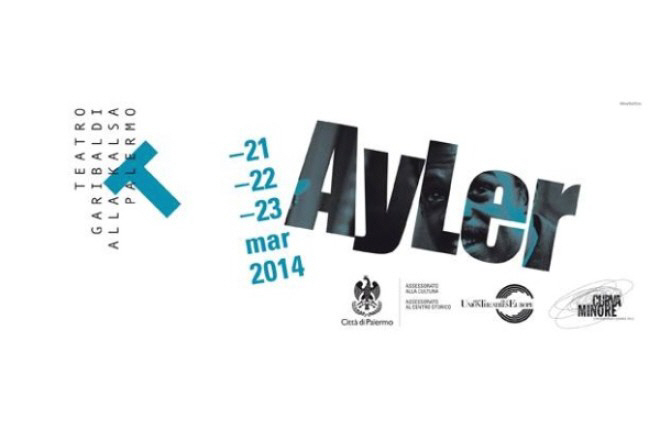 |
|||||||||||||||||||||||||||||||||
|
The programme was as follows: -21 marzo 2014 -22 marzo 2014 -23 marzo 2014 * From Sicily to Somerset Even later with this, a review of a concert by Night Train, featuring saxophonist Tim Hill, at the CICCIC in Taunton: “The second piece, New Ghosts by Albert Ayler, was introduced by Tim Hill as he strode out into the centre of the floor. His loud bird- like trills, followed by the unique tapping sounds from his keys, led us into another rousing number, definitely one to dance to. The saxophone continued to hold a dialogue with the audience, inviting a rhythmic response. The guitarist plucked out a distinctive melody on his intricately designed electric guitar, the drummer took over with a rip-roaring rhythm and the saxophonist answered with another humourous bird-like call.” I also liked this bit from later in the review: “During the piece by the famous guitarist Bill Frisell, Tim Hill suddenly disappeared into the cupboard from whence we could hear the far-off strains of his saxophone.” There’s a clip of the band on youtube and there’s more information about Tim Hill on the Tongues of Fire website. * Versions & Tributes |
|||||||||||||||||||||||||||||||||
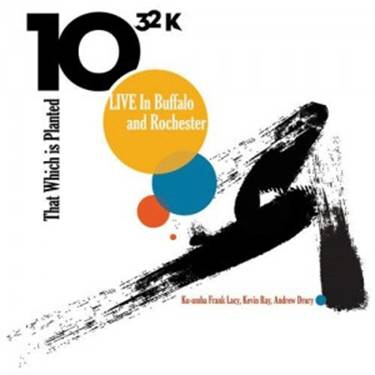 |
|||||||||||||||||||||||||||||||||
|
A new version of ‘Ghosts’ is included in the album, That Which Is Planted (Live in Buffalo and Rochester) by 1032K on the Passin’ Thru label. More information about the album is available on the band’s website, which also includes reviews and videos:
|
|||||||||||||||||||||||||||||||||
|
Number Six: Two Compositions for Improvisors by the Hans Rempel Octet, originally released on the FMP label in 1978, is now available as a download from Destination Out - ‘The exclusive home of FMP digital releases’ - which is part of bandcamp.com. The two compositions are ‘Number Six’ (two tracks of which are available on the site) and (the reason for the mention here) ‘Number Three [in memoriam Albert Ayler]’ which was recorded on 19th February, 1976. It may also be worth checking out the rest of the FMP releases on the Destination Out main page - lots of European improvisors, as well as albums by Cecil Taylor, John Tchicai, Sam Rivers and Steve Lacy. The downloads aren’t free, but there are plenty of complete sample tracks to enjoy. |
|||||||||||||||||||||||||||||||||
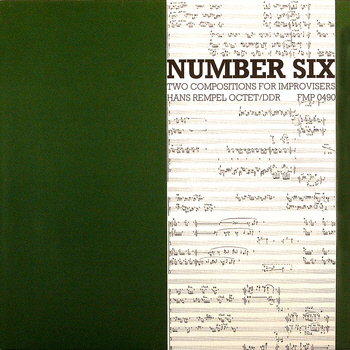 |
|||||||||||||||||||||||||||||||||
|
There’s another performance by the late Roy Campbell with Joe McPhee, William Parker and Warren Smith of their tribute to Albert Ayler on youtube, which I thought I’d linked to before, but apparently not:
|
|||||||||||||||||||||||||||||||||
|
And then there’s this, on vimeo - performance art (including a ‘walking woman’) from the Y Liver group, from FRASQ 2011 at Le Générateur, Paris: From The Cheap Talk series: Albert Ayler * Art Nate James’ Ayler-inspired collages are now available on a variety of objects (not only t-shirts, but also cushions and clocks) courtesy of the Young Weirdos Guild (one of the lesser-known medieval guilds). And the fact that I’ve added a third page to the Images of Albert section of the site should tell you that Yair Dagan has returned to the fold. Yair found all the above - many thanks. He also came across a transcription of ‘The Wizard’ on Todd Bishop’s blog, which I’ve added to the Sheet Music page, and a poem, ‘Truth Comes Marching In – Remembering Albert and Donald Ayler’, by Mark Kerstetter on the Jerry Jazz Musician site. There’s also an interesting piece on Mark Kerstetter’s own site, comparing Ayler with Van Gogh. * Jane Martha Reynolds is a name which always crops up when you do a google search for Ayler books because of her unpublished 1993 PhD thesis, Improvisation analysis of selected works of Albert Ayler, Roscoe Mitchell and Cecil Taylor. I’ve always hoped that this would turn up online somewhere, but so far, no luck. However, David Sanders emailed to suggest it should be included in the Ayler Bibliography and kindly added this brief description of the work: “The main discussion of Albert Ayler in this thesis fills the first chapter, summarized again later in the conclusion. It outlines Ayler’s unconventional improvisation and his composition styles and techniques, including his use of wide vibrato, motivic riffing, overblown notes, and folk themes. The main focus of the chapter is an analysis of Ayler’s improvisation on the version of Ghosts from Prophecy. Reynolds claims that Ayler’s improvisation progressively becomes more and more timbrally based (she means further away from the theme and traditionally sounded notes in general) until tonal references are the only structural device linking his improvisation to the composition.” * Albert at the BBC Thanks to my mate Clive, who told me Albert Ayler was mentioned in Stewart Lee’s Comedy Vehicle (BBC2, 22nd March) - it’s still available on the BBC’s iplayer, so you can check it out for yourselves if you don’t believe me (if Mr. Lee’s comedy stylings are not to your taste, it’s around the 11 minute mark). And thanks also to Sean Wilkie who let me know about another Ayler mention on BBC radio in the Jazz on 3 programme of 3rd March. The BBC seems to stick all its jazz programmes on Saturday afternoons (on the assumption that jazz fans don’t like football) or late at night (so they can switch off the lights, smoke their gauloises, sip absinthe and recreate the atmosphere of some Parisian dive) and I always remember to listen to them the day after they’ve disappeared from iplayer, so I missed this. However, Sean provided this summary: “I belatedly listened to my recording of last Monday’s Jazz on 3 feature on the relationship between religion and/or the church and free jazz. Not particularly illuminating, mostly seemed a bit old hat, although some interesting background on David Murray (his family raised him in a kind of holy-roller church). A few minutes in, after Archie Shepp has discussed the religious grounding of Coltrane’s music, Kevin Le Gendre mentions Albert thusly: “In fact, sacred music, from negro spirituals to modern gospel, has inspired many jazz legends. Especially freewheeling saxophonists like Charles Gayle and Albert Ayler.” Later on, the church saxophonist Vernard Johnson is discussed by both Murray and Shepp. Shepp says he was introduced to Johnson’s music by Marion Brown: “I heard this record of Bernard and it immediately reminded me of Albert”. The use of the upper register is discussed, in connection with religious ecstasy. Archie then tells a story about Mike White the violinist, who went to a rehearsal with the Ayler brothers, and discovered how impoverished and hungry they were. Albert says, Let’s play something. Let’s play hunger. Let’s play the feeling of hunger. There’s no further mention of Mike White after that; merely Shepp musing about how Coltrane was attracted to Ayler’s ‘position’.” * And another reason . . . I came across this on a Spanish newspaper site, so it’s probably quite well-known, but I thought it worth a mention. My Husband’s Stupid Record Collection is a blog where ‘the wife’ goes through ‘the husband’s’ record collection in alphabetical order and gives her opinion. If you skip to the bottom of the page you’ll find Spirits Rejoice given this treatment. Towards the beginning she says, “I don’t know who Albert Ayler is, but I can tell he plays saxophone,” which should prepare you for what’s to come. The husband’s postscript is also interesting. I did wonder whether I should do the same thing with my wife’s records, but there’s only so many John Denver LPs a man can listen to before the red mist descends. ***
May 1 2014
O, to be in Belgium ... Last July I was contacted by an ‘Ayler collector’ who said he had a 6 minute video clip of an Ayler performance at the second Sigma Festival in Bordeaux from a French TV programme. Details were sketchy and since the Sigma Festival gig was not listed in the Holy Ghost book, I enlisted the help of Pierre Crépon to find out more. Although he could shed no light on the TV programme, he discovered that the archives of the Sigma Festival had recently been distributed among various institutions in Bordeaux and the I.N.A. in Paris. Pierre confirmed that the video archives were at the I.N.A. but despite the efforts of Guy Kopelowicz and Axel van Looy, no information was forthcoming. Then, in March I got an email from a Belgian TV producer, Tom van Cleynenbreugel asking if I knew where he could get hold of some Ayler footage for a programme he was making. I explained the problems with the Fondation Maeght film and the brief clips in Kasper Collin’s My Name Is Albert Ayler, but pointed him in the direction of the I.N.A. and on 14th April he let me know that he'd managed to get hold of a 90 second clip which was then used in a programme (De Canvasconnectie) about the American folk singer, Sam Amidon, which was broadcast in Belgium on 30th March (with repeats on 31st March and 5th April). There are no plans to repeat the programme again and it won’t be made available online. I asked Tom if he could give me more information about the origin of the clip and he sent me the following description from the I.N.A. He also added that the full length of the Ayler performance was 6 minutes. “Titre propre : Nicolas Schöffer Titre émission : Carte blanche à Générique et auteurs : Réalisateur, Tarta, Alexandre ; Interprète, Ayler, Albert (saxophone) Descripteurs : Chaban Delmas, Jacques Date de diffusion : 28/11/1966 Durée : 00H 27MIN 12SEC Résumé / Description de l'extrait : - Spectacle organisé dans le cadre de la semaine d'action culturelle de Bordeaux, avec la Compagnie de danse contemporaine - Festival SIGMA, concert du groupe d'Albert AYLER (avec son frère Donald AYLER) qui joue "Ghosts" + applaudissements du public et Jacques CHABAN DELMAS en tribune - Le ballet de mobiles SARAPARDO - Personnages parlant, "c'était une grande étendue" avec des vagues derrière autour de leur personne - Orchestre - Ballet compagnie contemporaine SAKAPARDO - Le tout accompagné de bruits insolites et de décors mobiles - Jeux de lumières et intensité de son. Œuvres : - Le saxophoniste Albert AYLER interprète avec son groupe "Ghosts" Informations de classement Notice : CPF86618553 Type d'archive : Archive non thématisée Type d'émission : Production Type de notice : Notice isolée Genre : Spectacle TV Thématique : Variétés Date de modification : 20/12/2012 Informations de production Producteurs : Producteur ou co-producteur, Paris : Office national de radiodiffusion télévision française (ORTF), 1966 Nature de production : Production propre Informations de diffusion Date de diffusion : 28/11/1966 Société de programmes : Office Radio Télévision France Canal de diffusion : 2eme chaîne Collection : RTF / ORTF Informations techniques Statut du matériel : Numérisé ” So, the 90 seconds of Ayler at the Sigma Festival on 14th November 1966, broadcast (probably for the first time since 28th November 1966) in Belgium on 30th March 2014, was taken from the 6 minute video which I was first told about last July. Originally we’d hoped that there might be something more in the Sigma video archives, now held by the I.N.A., perhaps even film of the entire Ayler concert. That now seems doubtful. On the plus side we now have confirmation of the origin of the 6 minute video and which archive it’s buried in. So, thanks to Pierre, Axel, Guy, Tom and the ‘Ayler collector’ for at least getting us this far. *
New York Eye And Ear Control - 50 years on |
|||||||||||||||||||||||||||||||||
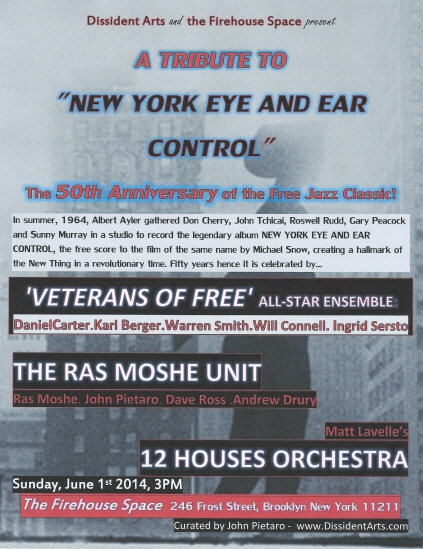 |
|||||||||||||||||||||||||||||||||
|
From the Firehouse Space website:
“June 1, 2014 3:00 pm The summer jazz concert season kicks off to an early start with a rousing tribute to the celebrated recording ‘New York Eye and Ear Control’ as it hits its golden anniversary. This seminal album of the Free Jazz canon was conceived by Albert Ayler and realized with an all-star ensemble of improvisers who defined the movement. Some fifty years hence, a wide swath of New York Jazz underground instrumentalists fete it with four sets of contemporary fire music. The headliners are a one-time only assemblage dubbed here as The Veterans of Free, a combo of artists who were vital parts of the scene during Free Jazz’s development and still stand now as leading figures. And the opening attraction is celebrated downtown poet Steve Dalachinsky whose mix of spoken word and improv crosses the decades. The other artists performing represent the improvisational new music sounds of the past thirty+ years heard in Manhattan and Brooklyn performance spaces right into today. Dissident Arts and the Firehouse Space present A TRIBUTE TO “NEW YORK EYE AND EAR CONTROL” The 50th Anniversary of the Free Jazz Classic! In summer, 1964, Albert Ayler gathered Don Cherry, John Tchicai, Roswell Rudd, Gary Peacock and Sunny Murray in a studio to record the legendary album ‘NEW YORK EYE AND EAR CONTROL’ (ESP-Disk), the free score to the film of the same name by Michael Snow, creating a hallmark of the New Thing in a revolutionary time. Fifty years hence it is celebrated by… 3pm – Steve Dalachinsky 3:30pm – The Ras Moshe Unit 4:30pm - Veterans of Free All Start Ensemble 5:30pm – Matt Lavelle’s 12 Houses Orchestra This event will be comprised of three 50-minute set with each of the three bands performing a piece inspired by one of the three improvisations heard on the classic album. They will complete their sets with music which illustrates the legacy of the New Thing.” * Milford Graves Masterclass 4/11/14
|
|||||||||||||||||||||||||||||||||
|
* A couple of things Richard Koloda has been reading the autobiography of Patti Smith, Just Kids, in which she mentions a time when she was reviewing records: “We had to scrape together every cent. We needed to raise four hundred fifty dollars, a month’s rent and a month’s deposit. Robert disappeared more than usual, making twenty dollars here and there. I had written some record reviews and was now receiving stacks of free records. After reviewing the ones I liked, I took them all down to a place in the East Village called Freebeing. They paid a dollar a record, so if I had ten records it was a good score. I actually made more selling records than writing reviews. I was hardly prolific and usually wrote pieces centered on obscure artists like Patty Waters, Clifton Chenier, or Albert Ayler. I wasn’t interested in criticizing so much as alerting people to artists they may have overlooked. Between us both we came up with the money.” Richard would like to find out if anyone knows which magazines/papers (presumably underground) Patti Smith wrote for, so that he can track down her Ayler review(s). A bit of a longshot, but if anyone can shed any light, just drop me a line. And I also heard from Steve Tintweiss, who sent me a link to this article, ‘An Ayler in My House’ by Nick Stillman, from The Nation, asking if I had it on the site. I did find a link to it back in 2008, it was prompted by the release of the Kasper Collin film, but it did make me think I should make a note of the reviews of My Name Is Albert Ayler which are still online, and, when they do disappear, I should add them to the site in the Reviews section. *** |
|||||||||||||||||||||||||||||||||
|
June 1 2014
Spiritual Unity - 50 years on Last month it was news of a concert celebrating the 50th anniversary of New York Eye And Ear Control - happening today to the Firehouse Space in New York. NYEAEC was recorded on 17th July, 1964 - a week earlier, on the 10th, Spiritual Unity had been recorded, and to celebrate that 50th anniversary, ESP, the label that brought us both truly groundbreaking albums, is preparing a special Ayler compilation, ‘The Albert Ayler Story’, which will be available to download on 24th June. No information on the ESP site as yet, just a link to some pre-publicity on the Something Else! site, which includes the following: “ESP plans to mark the anniversary when it issues The Albert Ayler Story. A download-only release that could fill up 4 CDs, the compilation will pull at least one track from each of Ayler’s ESP-Disk releases with portions of interviews with key musicians (including Ayler himself) recounting these sessions and live performances, as well as the significance of them and the man behind it all.” *
The New York Art Quartet No Ayler content here, but considering that two of the musicians on New York Eye And Ear Control, John Tchicai and Roswell Rudd, were also members of the New York Art Quartet, I thought I’d mention that there’s a film about the group, which I’ve only just come across. The Breath Courses Through Us is a 75 minute documentary, directed by Alan Roth, which premiered at the Marseille Film festival last July. The film’s website has all the information and there’s a review on the LRB blog site.
|
|||||||||||||||||||||||||||||||||
|
Marc Ribot Marc Ribot has a new CD, Live at the Village Vanguard, with his trio (Ribot, guitar, Henry Grimes, bass and Chad Taylor, drums), featuring two Ayler titles, ‘The Wizard’ and a 19 minute version of ‘Bells’. |
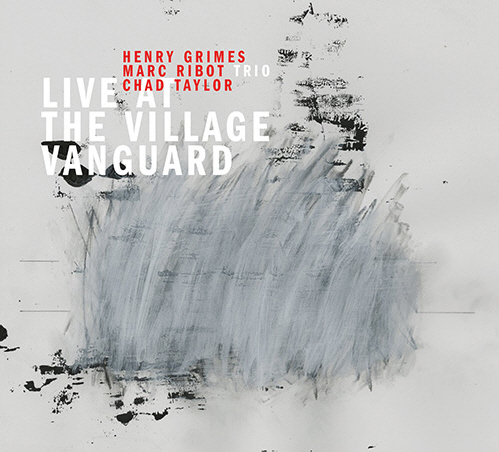 |
|||||||||||||||
|
Released on the Pi Recordings label, full details are on their site, there’s a review at the Los Angeles Times and an interview with Ribot at the SF Weekly, which includes the following: “To get into the live trio album, it is the closest thing I’ve heard to Sonny Sharrock’s Ask the Ages in terms of a guitarist’s take on latter-era Coltrane and Ayler... That’s a huge complement, because I’m a huge Sonny Sharrock fan. He’s one of the great and under-appreciated guitarists of the last hundred years. Like some other guitarists, I'm more inspired by sax players than other guitarists. I forget who said it, but someone said, “They don’t play guitar; they play a very weird saxophone.” For all I know it might have been Sonny Sharrock. It’s funny. I didn’t start really listening to Sonny Sharrock until after I was well along this path. And I think if I had, it might have saved the trouble. Because I feel there’s a lot of similar intention. For me, it’s a rich territory. What is it about Ayler’s music that touched you? Well, there are a lot of different things. I’ve spoken exhaustively on the subject, but what it boils down to first of all, Ayler’s stuff was a cool way out clichés for me. The compositional elements of his larger ensemble pieces are very interesting. They're not A-A-B-A like the standard jazz head. They're A-B-A-C-A-E-A-F-G [laughs]. If you listen to “Bells,” it’s not through composed, but these different sections keep coming up and being returned to in a really interesting way. What Ayler was doing in one sense was much simpler chordally than bebop. These are basically three-note chords rather than the four-note chords with a lot of extensions like you find in bebop and standards. So in that sense, it brought it closer to rock, which is where I was coming from harmonically. So you could play with the energy of rock without raising a big signifier saying “Ah! This is jazz. This is sophisticated.” You could be brutal and rude and immediate in the sense of a rock band. And at the time, I didn’t want to be signaling sophistication. I didn’t want to be expressing harmonic complexity at the time. So in one sense, it was a more restrictive, simpler language than bebop. On the other hand, through noise, atonal, and polytonal elements, it was more complex. Linguistically, I would say it skipped the middle range and went right to several extremes that I liked. So that’s one way of looking at Ayler. Another way of looking at Ayler is that, in his time, he was not considered jazz by everyone. He was considered a variation of spiritual music, and I’m not entirely sure this is wrong. Clearly he came out of jazz. But I’m not concerned with the labels. What impacted me was that there was a certain intensity. And this also tied into rock at its best. There’s a sense that you’re participating in a ritual that brings people out of their normal state. And I like that, too. The story of Henry Grimes re-emerging after such a long absence was something I was unaware of until I heard about this live album. How did you connect with him? Did you reconvene Spiritual Unity specifically to play Ayler’s songs with him? Yes, I did. I heard from Margaret Davis, now Margaret Grimes, that Henry was back in town and available for gigs. I was very happy because he had played on some of my favorite albums. It was amazing. I, like many other people, had just assumed he was not playing anymore if he was even alive at all, so it was fantastic to see him resurface on the scene. And I thought that a good way to make an introduction, and a good common ground would be using the music of Albert Ayler. That was the basis of Spiritual Unity.” *
Ayler in Jacksonville again! Last June I mentioned an Albert Ayler Commemoration concert at the Jacksonville Jazz Festival in Florida, which had taken place in May. Just to be consistent, I’m late again reporting this year’s event, which took place at the Karpeles Manuscript Library Museum from 23rd to 25th May. |
|||||||||||||||
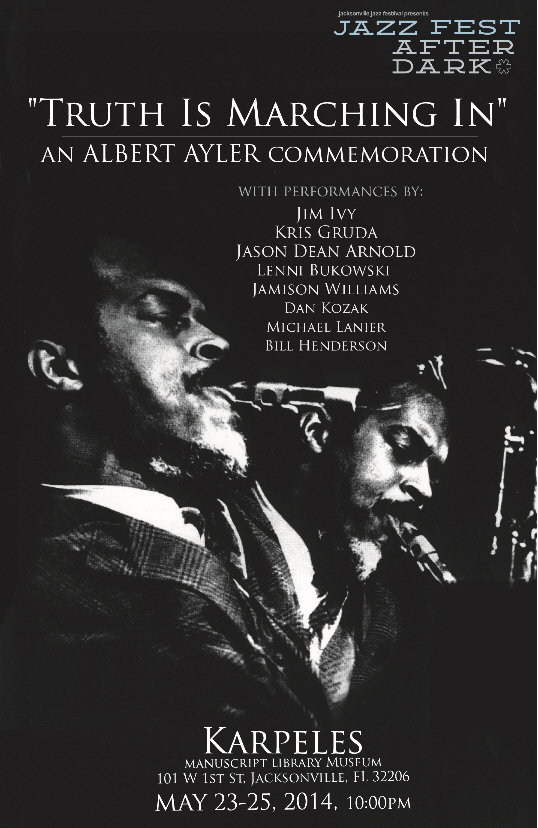 |
|||||||||||||||
|
I have to thank Jamison Williams for sending me all the information, including links to Anna Funk’s photographs on facebook and recordings of all three sessions at the Internet Archive. *
Poetry and Dance / from France I came across another modern dance piece inspired by Albert Ayler on youtube. Choreographed and performed by James Carlès, ‘Opus 07’ was created in 2006. There’s more information about the piece on James Carlès’ website, which includes the following: “James Carlès and Vs_Price collaborated to create music inspired by the works of Albert Ayler. The dialogue between the two artists is prolonged on stage because the music is played live, leaving the interpreters time to explore other possibilities during the show, all while following a well-defined framework. James Carlès mixes dance and music with two other partners who play a preponderant role in this solo: scenography and lights. Far from being accessories, these partners enable the choreographer and dancer to confront new constraints, to elaborate new forms, to construct and deconstruct space…”
|
|||||||||||||||
|
And there’s another book of poems about Albert Ayler in French - Fanfares à couteaux tirés: Esquisses autour d’Albert Ayler by Chim Nwabueze (France: L’Harmattan, 2014, 52 pages. ISBN. 978-2-343-03302-0). The title translates (according to google) as “Fanfare at loggerheads: Sketches around Albert Ayler”, which is why people write poems in French. Funnily enough there’s a village just outside Stoke called Loggerheads, but I think that’s a coincidence.. |
|||||||||||||||
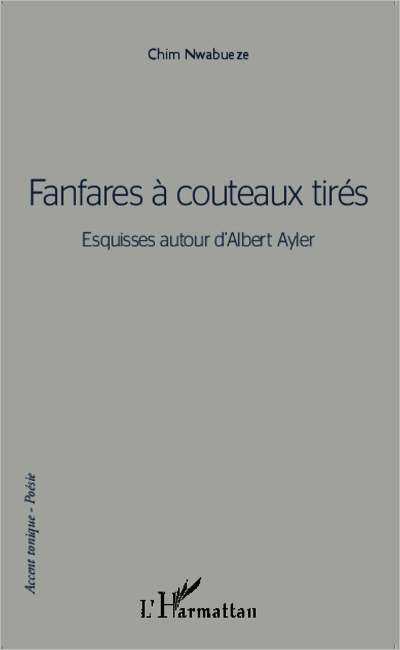 |
|||||||||||||||
|
Weirdness abounds I’ve found another couple of download versions of My Name Is Albert Ayler. I still don’t understand. |
|||||||||||||||
 |
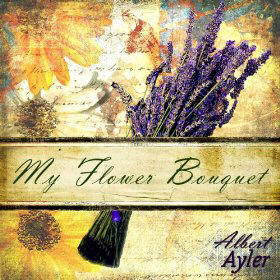 |
||||||||||||||
|
And finally ... I thought I’d just mention a couple of items. There’s an interesting interview (including youtube clips) with Peter Brotzmann on the Something Else! site. And I thought I should wish Sun Ra a happy hundredth birthday. I’m sure he’s still looking down on us from Saturn. |
|||||||||||||||
|
*** News from 2004 (January - June) 2004 (July - December) 2005 (January - May) 2005 (June - December) 2010 (January - June) 2010 (July - December) 2011 (January - May) 2011 (June - September) 2011 (October - December) 2012 (January - May) 2012 (June - December) 2013 (January - June) 2013 (July - September) 2013 (October - December) 2014 (July - December) 2015 (January - May) 2015 (June - August) 2015 (September - December) 2016 (January - March) 2016 (April - June) 2016 (July - August) 2016 (September - December) 2017 (January - May) 2017 (June - September) 2017 (October - December) 2018 (January - May) 2018 (June - September) 2018 (October - December) 2019 (January - May) 2019 (June - September) 2019 (October - December) 2020 (January - April) 2020 (May - August) 2020 (September - December) 2021 (January - March) 2021 (April - July) 2021 (August - December) 2022 (January - April) 2022 (May - August) 2022 (September - December) 2023 (January - March) 2023 (April - June) 2023 (July - September) 2023 (October - December) 2024 (January - March) 2024 (April - June) 2024 (July - September) 2024 (October - December)
|
|||||||||||||||
|
Home Biography Discography The Music Archives Links What’s New Site Search
|
|||||||||||||||
